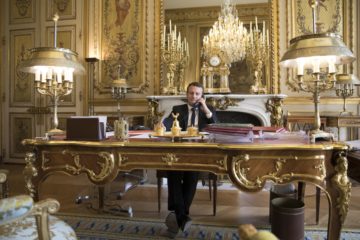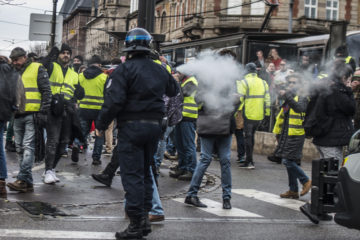For three days, Paris was the capital of the world. On 11 November, over 70 world leaders gathered in Paris to celebrate the moment all guns fell silent on the Western front, and to mark the opening of the Paris Peace Forum. World leaders will not only mourn the deaths of 40 million men and women but hear the history of the First World War reflect our own troubled century. French President Macron’s speech reminded us that the return of nationalism and American isolationism on the international scene today are what paved the way towards the Second World War a century ago; the Paris Peace Forum, a global platform to tackle global challenges, reminds us that better governance and collective action bring peace. This armistice centennial shows that, more than any other conflict, it is the legacy of the First World War that lives on today.
Macron’s critique of nationalism stems from a view of history wherein excessive national pride has dangerous consequences. The Wilsonian rhetoric of self-determination did not bring peace but oversaw the rise of excessive nationalism as it failed to deliver on its promise of national independence and promoting countries’ rights to choose their own government. This in turn fuelled the development of authoritarian regimes in Europe, while America’s isolationism allowed the eruption of another global conflict. Macron has said that he was “struck by similarities between the times we live in and those between the two world wars.” While his long list of what is wrong with the world held no explicit culprit, everyone knows from the angry tweets that followed whom it was directed against. Trump’s “America first” and advocacy of interest-driven policies are in fact troubling echoes of the First World War’s aftermath. It is those same isolationist policies that condemned the League of Nations a century ago. Without America’s support, the League of Nations or any attempt at international cooperation never stood a chance. The question is whether multilateralism can survive today as its most powerful supporter withdraws from it.
At a time when the world order is put on trial by the very same country that built it, Europe reaffirms her commitment to multilateralism. The message from the Paris Peace Forum is clear. Much like a century ago, national retreat is not an effective answer to our current situation. Whether Europe can inject new life into our decaying world order remains to be seen, but as America steps down, it is Europe who steps up.
Macron’s call to “tend to the garden of the liberal order” as Robert Kagan writes, is not only about honouring the promise of “never again”. While salvaging the world order might be first on the armistice centennial’s agenda, there is an implicit ambition behind Macron’s somewhat idealistic peace forum. America returning to her traditional isolationism gives Europe a unique opportunity to sit on “the empty throne”, because if no one else will, then it is Europe who will take the lead to rescue the world “that America made”.
But setting aside big ideas for a moment, Europe knows that if the US has much to lose, it will cost them even more if the current world order were to collapse. An “empty throne” is an opening for China to rewrite the rules: “As the US retreats globally, China shows up”, said Chinese General Jin in January 2018. Authoritarian regimes have happily used the current liberal crisis to show that “their sociopolitical systems work better than liberal democracy.” Or an “empty throne” is a “world with no leader and competing powers” and we have seen what such a world looks like from Europe’s history. But if Europe recognises that such a world is not desirable, what does she concretely intend to do about it to?
Macron’s vision for Europe outlined in the peace forum is clear. In a fracturing order between emerging powers such as China and Russia who are hoping to rewrite the rules of the game in their advantage and America abdicating, it is Europe’s chance to rise. Thierry Montbrial warned during the World Policy Conference that the 21st century would be articulated around the US-China rivalry for domination and that Europe has a strategic role to play in this new bipolar world. If the European construction were to fall apart, it would not only be a tragedy for EU members but for the entire world. The disintegration of the EU could mean the return of a Cold War balance of power. Macron’s plea to not let multilateralism wither away falls alongside his appeal for a stronger Europe, that this is the time for Europe to rise above its internal divisions and take up America’s mantle.

But judging from Trump’s latest tweets, Macron’s plan for a stronger Europe is not one that America likes. Macron has used his war remembrance tour to call for a European army which Trump believes would undermine NATO. Europe must be able to defend itself without relying on the US, he says, especially with Russia so close to the borders. Macron is reviving the old debate that has long divided Europe and is now at the forefront of all talks regarding Europe’s future as a political actor. Europe has talked about it for a long time but as of today, nothing has been done to implement it. The last attempt at “strategic autonomy” was boycotted by France herself in 1954 and has since then shown no promise. For now, the lack of resources and the fear that it would damage the EU’s relationship with the US make it just another attractive fantasy.
Between accusations against America and talks of a European Army, the Paris Peace Forum has raised many questions. What will come out of it remains to be seen. With Trump’s current approach to global affairs, Macron’s ambitions for Europe are well-founded, but whether the EU can carry the liberal order without America is doubtful. Europe alone was certainly incapable of keeping the League of Nations alive or of preventing the fragile order borne by it from crashing down during the Second World War. Looking at Europe’s history, it is also very doubtful that anything will come out of Macron’s rhetoric for a European army. But in these uncertain times that provide a unique opportunity for Europe to reaffirm its strategic role in the world, as Angela Merkel said, “we Europeans really must take our fate into our own hands.”


